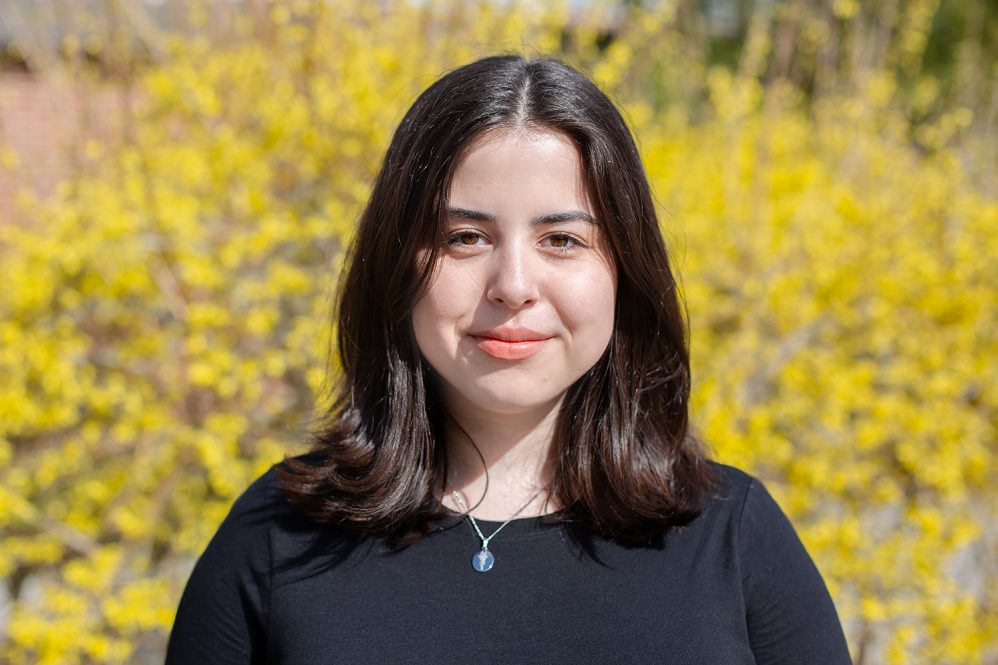With two majors and two minors, Samantha Gove ’24 (CLAS) spent a lot of her time at UConn concentrating on academics. When she wasn’t studying, Gove worked extensively with the Native American Cultural Programs. In her eyes, being a student in CLAS has defined her UConn experience, which she would do “one hundred times over again.”
Why did you choose to go to UConn?
To be honest, I chose to go to UConn during the pandemic because it was the most affordable option for me with the highest quality of education. The ratio just really worked out at a time when my family wasn’t certain about what our finances would look like in the future.
What drew you to your field of study?
I was actually accepted to UConn through Engineering and I switched my first year to sociology because I wasn’t exactly sure what I wanted to do yet, but I knew that I was fascinated by people and social systems and cultures. In my second year, I got deep into work with Native American rights and Native American cultural education, and so I became interested in human rights and law. I also added a minor in psychology and political science when I figured it would fit quite well with my pre-existing course of study and my future goals as I realized I might be interested in law school.
What activities were you involved in as a student?
The most major thing I’ve done outside of academics in my time at UConn has been working at Native American Cultural Programs. Through there I got a lot of really great experience in mentorship and in facilitating events and group programs. I was also the President of the Native American and Indigenous Students Association, a BOLD scholar, a mentor for The Major Experience, and a member of the Human Rights and Action Learning Community. Outside of that, I spent a lot of time on various research projects with the Office of Undergraduate Research.
What’s one thing that surprised you about UConn?
Being a first-generation college student, I don’t think that I expected there to be quite so many resources and quite so many departments and offices catered to every possible thing a student could need help with, although it makes perfect sense that these exist.
What was it like starting college during the pandemic?
I was very lucky to have had a scholarship that covered my housing, so it wasn’t a financial burden to live at school freshman year. It was definitely a period of struggle and transition. To look on the bright side, I had two years that felt like freshman year, so I got the opportunity to try a lot of things “for the first time,” twice.
What are your plans for after graduation?
I’m currently planning to work for a year and in that time take the LSAT and apply to law school.
How has UConn prepared you for the next chapter in life?
UConn has prepared me very well for my next chapter. I’ve been very lucky to have so many opportunities to participate in research and work on representative councils at UConn, and those experiences have taught me a lot of skills that are applicable to my future.
Any advice for incoming students?
Put yourself out there in every possible way! Go to the involvement fair and join clubs and activities just to try them; it’s the best way to meet people and decompress outside of academics.
What’s one thing everyone should do during their time at UConn?
Everyone should attend one of every kind of sports game. Part of the quintessential UConn student experience is being silly and carefree in the student section.
What will always make you think of UConn?
The color navy blue, and all of the free T-shirts I got in my time here that are now a part of my wardrobe.
How has being a student in the College of Liberal Arts and Sciences impacted your UConn experience?
Being a student in CLAS defined my UConn experience in a lot of ways. It’s decided my course of study but also the professors I’ve met and the academic advisors I’ve been assigned, and thus those are the people I’ve made connections to, who have mentored me and written letters of recommendations for me.



